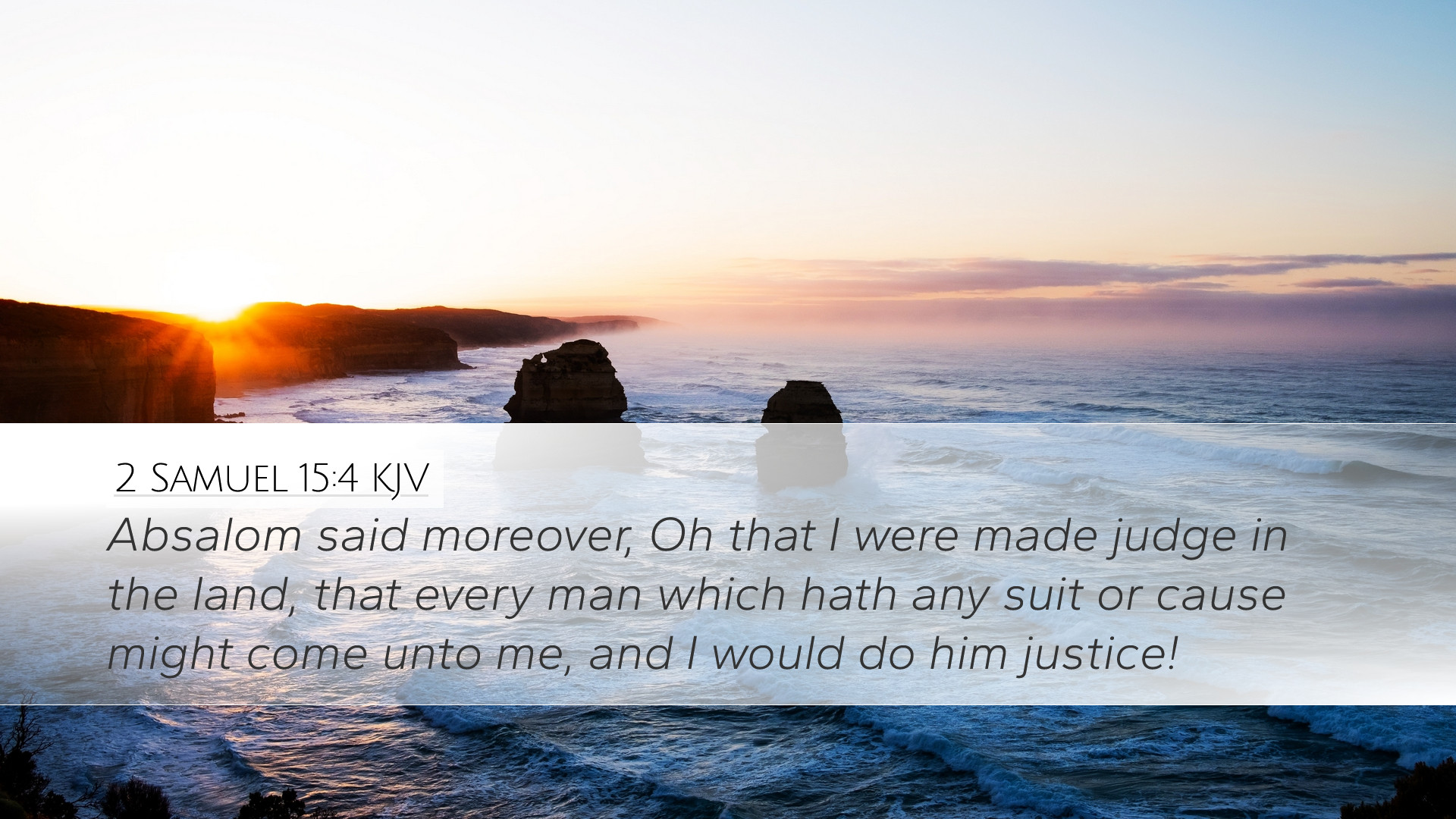Commentary on 2 Samuel 15:4
2 Samuel 15:4 reads: "And Absalom said, Moreover, O Israel, the king's word is good: but I am a better judge than he." This verse encapsulates a pivotal moment in the narrative of Absalom's rebellion against his father David.
Contextual Overview
The backdrop of this verse is the brewing discontent within Israel. Absalom, the son of David, publicly questions the effectiveness of his father's rule and positions himself as a preferable alternative. This act of rebellion not only highlights Absalom's ambition but also reveals the vulnerabilities within David's kingship.
Insights from Matthew Henry
Matthew Henry interprets this moment as a strategic move by Absalom to win the hearts of the people. Henry remarks that Absalom artfully appeals to the desires of the citizens of Israel:
- Popularity vs. Wisdom: Henry notes that Absalom's claim of being a better judge points to the human tendency to prioritize personal charisma over divine wisdom.
- Appeal to Justice: He emphasizes that Absalom's manipulative approach is aimed at appearing just and equitable, insinuating that David's judgments are faulty.
- Willingness to Serve: Henry points out that Absalom's fabricated commitment to serve the people's needs serves to mask his treachery.
Insights from Adam Clarke
Adam Clarke elaborates on the implications of Absalom's statements. He examines the nature of Absalom's claims in light of political and social structures:
- Political Maneuvering: Clarke suggests that Absalom's actions are emblematic of the political climate in which personal ambitions can supersede rightful authority.
- Corruption of Leadership: He warns that this instance exemplifies the dangers of leaders who prioritize their ambitions over the well-being of the people.
- Divine Repercussions: Clarke reflects on the inevitable consequences Absalom would face, suggesting that such rebellion against divine order brings severe repercussions.
Insights from Albert Barnes
Albert Barnes offers a pastoral perspective on the passage, emphasizing the moral and ethical implications of Absalom's rejection of his father's authority:
- Rebellion Against God: Barnes asserts that Absalom's challenge is not simply against David but against God's ordained leadership over Israel.
- Public Perception: He highlights how Absalom's consideration resonates with the masses, demonstrating the fragility of public opinion in matters of governance.
- The Dangers of Flattery: Barnes warns that Absalom's flattery and deceit serve as cautionary tales about the allure of false leaders.
Theological Implications
This verse serves as a profound reminder of the themes of authority, rebellion, and the moral responsibility of leaders:
- Authority Established by God: The Bible teaches that all authority is ultimately ordained by God (Romans 13:1). Absalom's rebellion illustrates the dangers of usurping such authority.
- Human Hearts and Ambition: The episode invites self-reflection on the human condition—how ambition can cloud moral judgment and lead to destructive paths.
- Call for Discernment: Pastors and leaders are encouraged to seek Godly wisdom and discernment in navigating their roles, avoiding the pitfalls of Absalom's actions.
Conclusion
In 2 Samuel 15:4, we witness a tragic interplay of ambition, manipulation, and the quest for power. Examining the insights of respected commentators like Matthew Henry, Adam Clarke, and Albert Barnes provides a layered understanding of the text and serves as an invaluable lesson for contemporary leaders and scholars. It calls us to reflect on our own motives and the nature of our leadership, urging us to align with God's ordained purpose rather than succumbing to personal ambitions.


